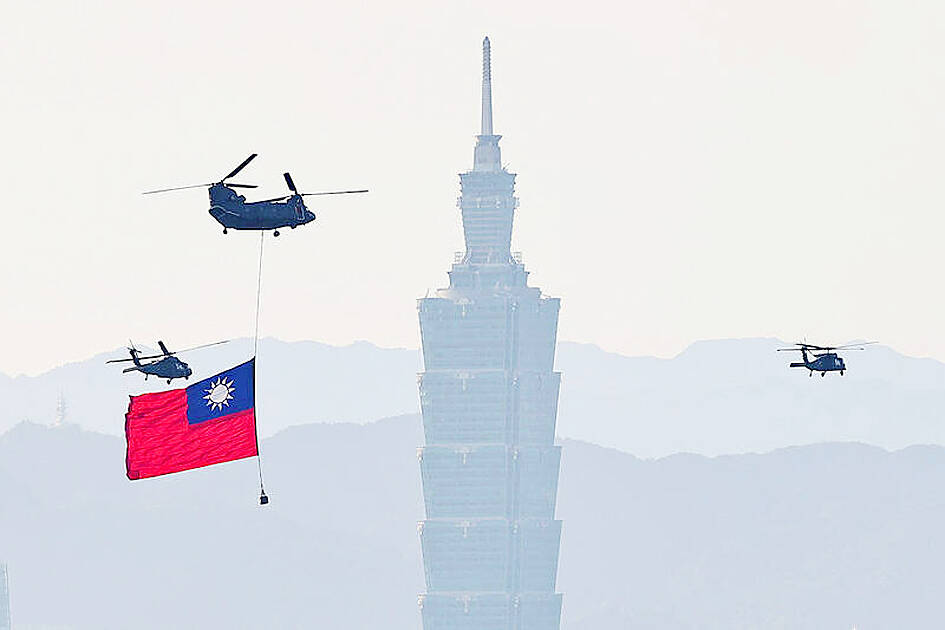Taiwan moved up one spot to the sixth place in the global competitiveness rankings on better government and business efficiency, the Switzerland-based International Institute for Management Development (IMD) said yesterday.
It is the nation’s best showing since 2012 and it marked the fifth consecutive year it has advanced, even though Taiwan’s economy had declined noticeably, the IMD’s annual report said.
Taiwan was ranked the second-most competitive economy in Asia, behind Singapore, it said.

Photo: Reuters
The IMD report graded 64 economies based on their standings in four main categories: economic performance, government efficiency, business efficiency and infrastructure.
Taiwan this year gained two places in both the government efficiency and business efficiency rankings to sixth and fourth spot respectively, the report said.
The improved government efficiency came after Taiwan acted to lower government debt and bolster its financial health, said the National Development Council, which helped gather data on the nation’s behalf.
The subfactors on institutional framework, business legislation and social framework also retreated in the rankings, but the gauge on tax policy remained high at No. 4, the council said.
The progress in business efficiency reflected enhanced productivity and efficiency, and improved finances, management practices, attitudes and values, the IMD said.
Taiwanese companies are very good at using big data and analytics to support decisionmaking and demonstrate prowess at responding quickly to opportunities and threats, it said.
Local firms also beat their global peers in terms of entrepreneurship and the credibility of managers in society, it added.
However, the council said that Taiwan is relatively weak in labor market performance under the business efficiency category, falling from 17th to 25th in this year’s report.
The challenges lie particularly in the shortage of migrant and highly skilled foreign workers, the council said, adding that it would put more emphasis on retaining the foreign workforce.
The infrastructure reading climbed one spot to 12th place, thanks to healthy showings in technology infrastructure, including 4G and 5G coverage, research and development spending, and advanced technology leadership, the report said.
However, Taiwan’s economic ranking fell from ninth to 20th place, as the nation’s export-oriented economy took a hit from global economic weakness induced by drastic interest rate hikes by major central banks to curb inflation.
Denmark, Ireland and Switzerland were named the top three economies this year, while Singapore dropped one position to fourth, the Netherlands moved up one place to fifth and Hong Kong fell to seventh from fifth place, the report said.
The US improved one place to ninth, followed by the United Arab Emirates in 10th. China ranked 21st, while South Korea ranked 28th.
Additional reporting by CNA

SILICON VALLEY HUB: The office would showcase Taiwan’s strengths in semiconductors and artificial intelligence, and help Taiwanese start-ups connect with global opportunities Taiwan has established an office in Palo Alto, one of the principal cities of Silicon Valley in California, aimed at helping Taiwanese technology start-ups gain global visibility, the National Development Council said yesterday. The “Startup Island Taiwan Silicon Valley hub” at No. 299 California Avenue is focused on “supporting start-ups and innovators by providing professional consulting, co-working spaces, and community platforms,” the council said in a post on its Web site. The office is the second overseas start-up hub established by the council, after a similar site was set up in Tokyo in September last year. Representatives from Taiwanese start-ups, local businesses and

EXPRESSING GRATITUDE: Without its Taiwanese partners which are ‘working around the clock,’ Nvidia could not meet AI demand, CEO Jensen Huang said Taiwan Semiconductor Manufacturing Co (TSMC, 台積電) and US-based artificial intelligence (AI) chip designer Nvidia Corp have partnered with each other on silicon photonics development, Nvidia founder and CEO Jensen Huang (黃仁勳) said. Speaking with reporters after he met with TSMC chairman C.C. Wei (魏哲家) in Taipei on Friday, Huang said his company was working with the world’s largest contract chipmaker on silicon photonics, but admitted it was unlikely for the cooperation to yield results any time soon, and both sides would need several years to achieve concrete outcomes. To have a stake in the silicon photonics supply chain, TSMC and

‘DETERRENT’: US national security adviser-designate Mike Waltz said that he wants to speed up deliveries of weapons purchased by Taiwan to deter threats from China US president-elect Donald Trump’s nominee for US secretary of defense, Pete Hegseth, affirmed his commitment to peace in the Taiwan Strait during his confirmation hearing in Washington on Tuesday. Hegseth called China “the most comprehensive and serious challenge to US national security” and said that he would aim to limit Beijing’s expansion in the Indo-Pacific region, Voice of America reported. He would also adhere to long-standing policies to prevent miscalculations, Hegseth added. The US Senate Armed Services Committee hearing was the first for a nominee of Trump’s incoming Cabinet, and questions mostly focused on whether he was fit for the

INDUSTRIAL CLUSTER: In Germany, the sector would be developed around Taiwan Semiconductor Manufacturing Co’s plant, and extend to Poland and the Czech Republic The Executive Yuan’s economic diplomacy task force has approved programs aimed at bolstering the nation’s chip diplomacy with Japan and European nations. The task force in its first meeting had its operational mechanism and organizational structure confirmed, with Premier Cho Jung-tai (卓榮泰) the convener, and Vice Premier Cheng Li-chiun (鄭麗君) and Minister Without Portfolio Ma Yung-cheng (馬永成) the deputy conveners. Minister of Foreign Affairs Lin Chia-lung (林佳龍) would be the convener of the task force’s strategy group in charge of policy planning for economic diplomacy. The meeting was attended by the heads of the National Development Council, the Ministry of Economic Affairs, the